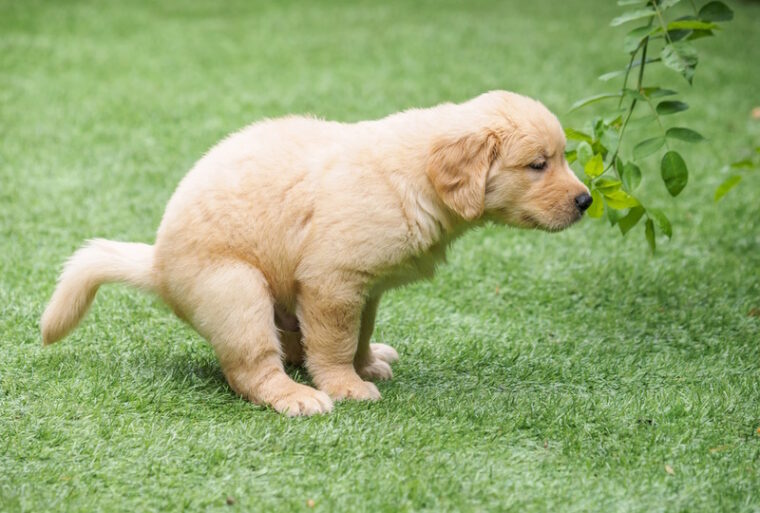
Click to Skip Ahead
The Puppies poop—a lot. It’s not uncommon to count up to six poops a day, which usually occur soon after eating. The reason why puppies poop a lot is because their intestinal tract isn’t fully developed yet, so things will start to slow down as they get older. Healthy poop will be soft, brown and can vary in size. However, anything runny, hard, or tinged with blood is a sign that something is not right, and you should contact your veterinarian about it.
But what does it mean if your puppy isn’t pooping? This is usually an indication that something isn’t right with your pup, but the good news is that it is usually easy to treat. Puppies can become constipated for many reasons, such as stress, an ungroomed coat, or eating something they shouldn’t have. If your puppy hasn’t pooped in 48 hours, it is vital that you take them to the vet for a full examination.
Signs of Constipation
If you have ever been constipated, you’ll know how uncomfortable and stressful it can be. The same is true in dogs, and you’ll see these signs in their behavior. Apart from not being able to poop, your dog will also be straining to poop. It is important to provide your pup with plenty of water as it softens poop, making it easier to pass.
Although sometimes mistaken for being a sign of worms, constipated pups might drag their bottoms on the ground (although this can also just mean an itchy bottom or full anal glands). Some other signs of constipation include:
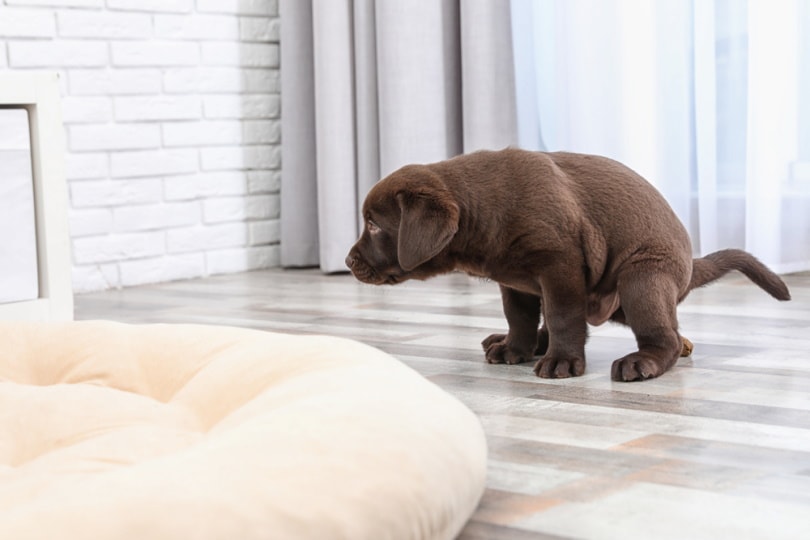
Is Constipation Dangerous?
Constipation will likely occur a few times in your dog’s life, but some dogs have it chronically, which can lead to obstipation, which is when the colon stops pushing the feces, stopping the dog from being able to poop at all. A colon that is so full of dry, hard poop can develop into a condition called megacolon. To avoid it from becoming this severe, it is important to get your puppy’s constipation treated quickly.
Megacolon is dangerous because it causes the colon to become enlarged and will likely require your dog to be hospitalized because the colon will need to be treated and emptied while your dog is under anesthesia. Once these dogs have recovered, they will need to live on a high-fiber diet and get regular exercise to prevent the recurrence of megacolon.
The 9 Common Reasons Why Your Puppy Isn’t Pooping
1. Diet
Your puppy’s diet plays a massive role in their digestion. Low-quality food or too many table scraps can lead to constipation, because they are consuming too much fiber. However, consuming too little fiber can also cause constipation. Many cheap commercial dog foods are processed and packed with grains or cereals that don’t contain enough insoluble dietary fiber to keep dogs regular.
Therefore, it is important to feed your dog good quality food that is nutritionally balanced, to ensure they’re getting the right amount of fiber to keep their poop moving with ease.
A change in diet can also stop your pup from pooping, as their digestive system needs time to adapt to the new food. Diarrhea is more common in this case, but some dogs experience the opposite. Be sure to transition your dog slowly from their old food to their new food.
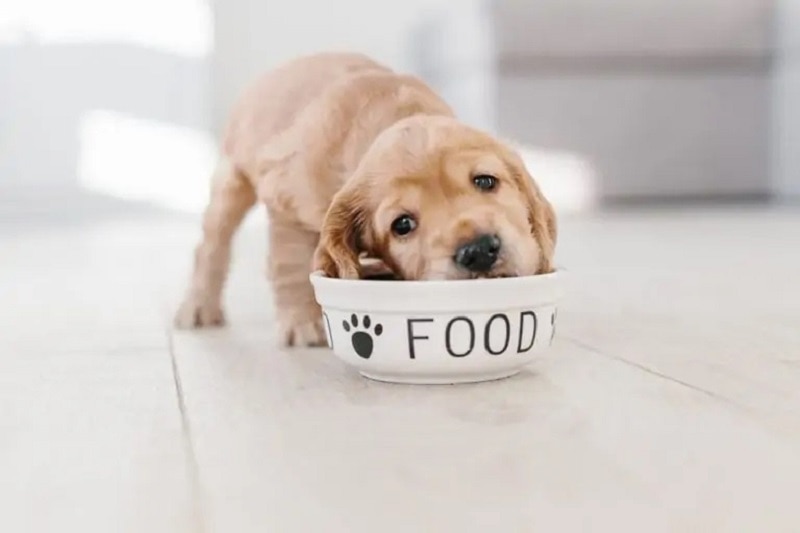
2. Dehydration
Dehydration can also cause constipation. The role of the large intestine is to reabsorb water from the poop. If your dog isn’t consuming enough water throughout the day, this process will lead to dry, hard poop that is difficult to pass.
There are many reasons why your dog can become dehydrated, which include not having enough accessible water around, heatstroke, illness, vomiting, and diarrhea. Your dog may not be getting up to drink water due to pain from arthritis or another condition that makes getting up and down difficult.
Make sure that you put out plenty of water around your home and yard so that your dog has easy access to water and can remain hydrated, especially on a warm day. If your dog is struggling to stay hydrated, feed them canned food as it is high in moisture, and you can add extra water to their meal.
3. Lack of Exercise
Dogs need exercise to stay fit, healthy, and stimulated, but also to keep their digestive systems functioning normally. A walk a day could very well keep the vet away! If your dog is struggling with constipation, try to walk them more frequently. These walks don’t have to be very long but try to take them out several times a day until their fecal movement goes back to normal.
You could also try different forms of exercise each day, such as a walk and extended playtime outside. Get them running after balls and tugging on ropes, as these activities work wonders in dogs.

4. Change
As pet owners, we sometimes forget how sensitive our dogs can be, and often don’t realize the impact that our choices can have on them. Change can be a massive stress factor for dogs, which can affect their bowel movements.
If your dog has become constipated, consider any recent changes to their routine. It could be the result of you having gone away on holiday for a few days and your dog was left alone with a new pet sitter. A new baby, pet, or visitor can also cause your dog to clamp up.
5. Pain
If your puppy had a bad injury, has under-developed joints, or suffers from hip or elbow dysplasia, they may have developed arthritis. The inflammation that occurs in the joints causes pain in dogs and can make getting up and down painful. It can even become so bad that pooping becomes painful, and your pup may stop pooping because of it. You may notice your pup struggling with this condition if they start limping, are stiff, vocalize when getting up or down, licking at painful areas, and are excessively tired.
Your pup will need to be seen by a veterinarian who can manage their pain with certain medication and a stricter diet. Once your pup’s pain is managed, they will be able to be a bit more active. These two factors will help reduce their constipation.
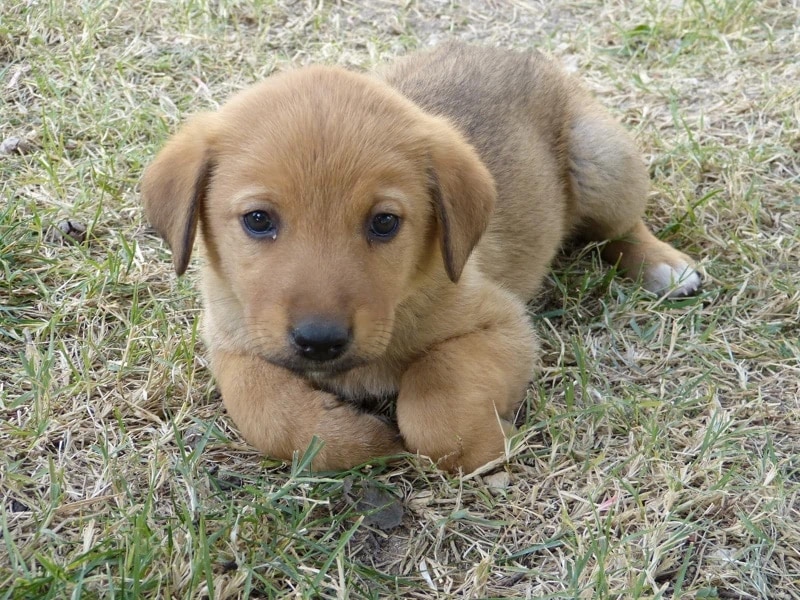
6. Enlarged Anal Glands
A dog’s anal glands have a scent that tells other dogs a lot about them. When dogs meet, they sniff each other’s anal glands to gather information about them. This scent is also used to mark a dog’s territory. When these glands become enlarged, it is a sign that they may be impacted or there could be an infection. They can be painful, have a foul smell, and they can cause your dog to become constipated.
These glands are expressed naturally when a dog poops, but enlarged anal glands will need to be expressed by a veterinarian. A common sign of impacted or enlarged anal glands is dragging their bottom along the floor, or ‘scooting’.
7. Matted Fur
Taking your puppy to the groomer or grooming them yourself isn’t only done to keep them clean and looking good; it is also to prevent mats from forming. Dogs with longer coats can develop mats around the anus, preventing them from being able to poop.
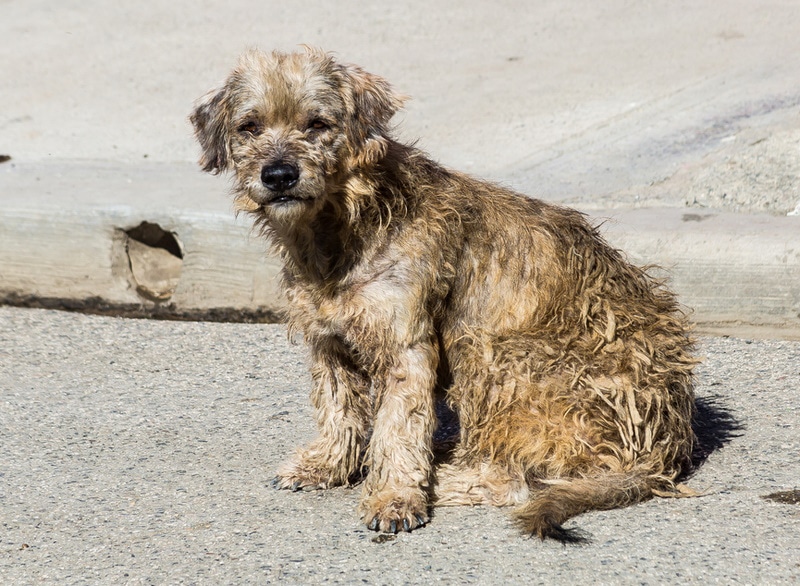
8. Intestinal Blockage
Puppies have a habit of eating things they shouldn’t, and you may find remnants of clothing, socks, toys, and even sticks in the poop. However, sometimes, these foreign objects can get stuck in their intestines or cause a blockage.
An intestinal blockage is a serious problem because it stops food and water from being able to pass through the intestines, which will result in the puppy not pooping. It can also cause dehydration, as well as damage to the intestines.
A pup with an intestinal blockage will have persistent vomiting, a loss of appetite, pain, and lethargy. A puppy with a partial blockage may have diarrhea, while puppies with a complete blockage will experience constipation. Puppies with this condition need to be seen by a veterinarian right away.
9. Congenital Hypothyroidism
Hypothyroidism is common in older dogs but not in puppies, so when pups have an underactive thyroid gland, it is usually because of a rare condition called congenital hypothyroidism. If there is a problem with the thyroid gland, the puppy won’t develop normally and will likely be smaller and shorter than other dogs their age. They will also struggle mentally.
Common signs and symptoms associated with congenital hypothyroidism are lethargy, tremors, bulging eyes, protruding tongue, poor appetite, and constipation. Puppies with this condition will need to be placed on treatment as early in their development as possible.
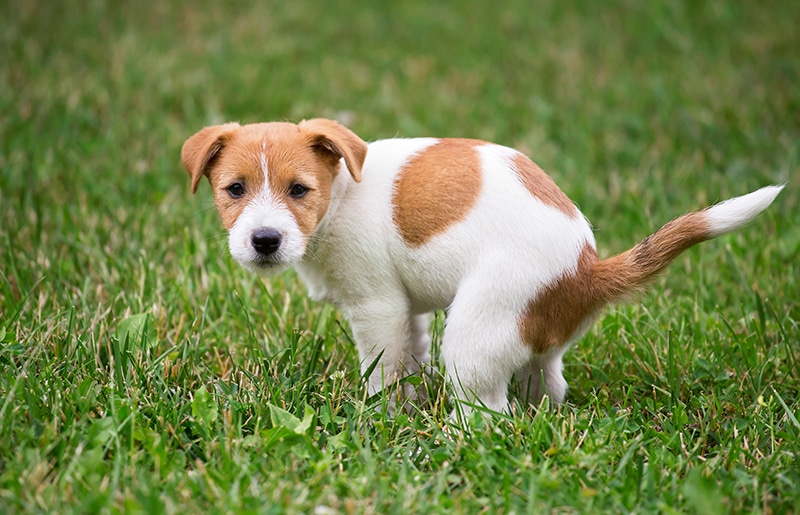
What to Do If Your Puppy Has Stopped Pooping
If things have slowed down digestively in your pup, start by increasing their hydration by encouraging them to drink more water. You can also feed them canned food and vegetables that are high in water, such as cucumber.
Remember that exercise helps reduce constipation, so take your puppy on frequent walks. To increase the fiber in your puppy’s food, add 100% canned pumpkin to their meals. The added fiber should help their stomach become more regular.
Unfortunately, some reasons for constipation cannot be treated at home. If your puppy hasn’t pooped in 48 hours, they need to be seen by a veterinarian. If your puppy hasn’t pooped, it could be an indication that they have an intestinal obstruction, which could be partial or complete, or they could have an underlying health condition that only a veterinarian can treat.
If it has been less than 48 hours and you’re worried about your puppy or you see other symptoms of concern, reach out to your veterinarian. If your veterinarian isn’t concerned about your puppy’s health, at least they can give you peace of mind.
Conclusion
Puppies have frequent bowel movements, which can occur up to six times a day. If they stop pooping, it is not normal, and there might be an underlying health condition. Your puppy may have stopped pooping due to a change in their diet or due to a poor-quality diet. It could also be the result of dehydration, a lack of exercise, stress, anxiety, pain, and other factors.
You should not wait long to intervene if your puppy is constipated, as things can get worse. Instead, add fiber to their diet, increase their water intake, and get them exercising. If nothing changes, take them to the veterinarian for an examination.
Featured Image Credit: atiger, Shutterstock







